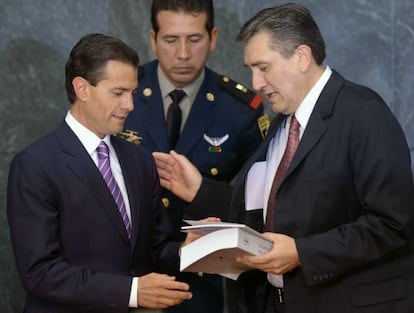Mexico’s top human rights official calls for forced-disappearance laws
Iguala and Tlatlaya massacres have made Mexicans more aware of abuses by authorities


Mexico’s top human rights official urged President Enrique Peña Nieto on Wednesday to act quickly to introduce new laws dealing with torture and forced disappearances in the wake of the recent massacres of 43 students and a group of suspected drug traffickers.
National Human Rights Commission (CNDH) president Luis Raúl González said that, as well as introducing laws addressing forced disappearances, Mexico also needed to create a database of genetic information that would help identify the bodies of murdered kidnap victims.
“The violence over the past years has resulted in the disappearance of people, whose numbers are unknown. They have not been identified and, consequently, have not been searched for effectively,” González said standing next to Peña Nieto at Los Pinos presidential palace in Mexico City.
González said Mexico also needed to create a database of genetic information to help identify victims
The CNDH president made his comments as he presented the commission’s annual report to the Mexican leader.
González was appointed to head the commission just four months ago, arriving at the most crucial moment of the country’s worst human rights crisis in 20 years.
In September, Mexico was rocked by the kidnapping of 43 teaching school students in Iguala, Guerrero state, following a skirmish with local law enforcement authorities. More than 90 people have been arrested in connection with the tragedy, including the mayor of Iguala and his wife, both of whom have been linked to drug traffickers.
“Iguala is not a closed case; we need to uncover the truth, make reparations for the victims, punish those who are responsible, and at all cost avoid it taking place again,” he said.
Last June, the CNDH also had to deal with the massacre of 22 alleged drug traffickers, which took place in Tlatlaya. They were reportedly burned alive by their arresting military officers.
In another case, police fired tear gas on a group of protestors in Chalchihuapan, Puebla state, in July, killing one child.
All these incidents, González said, have made Mexicans realize the seriousness of the human rights situation in their country.
In the last year, the CNDH filed 148 complaints in connection to alleged abuses committed by authorities but only 24 cases had been resolved by the end of December.
In the last year, the CNDH filed 148 complaints in connection to alleged abuses by authorities
González recognized that cases were being investigated at a slow pace, but also added that in many instances officials ignored the CNDH’s recommendations for improvements to the system.
Among the institutions with the most complaints are Mexico’s Social Security Institute, the prison system, the defense department, and the federal police.
Peña Nieto reminded González that there was pending legislation to deal with these issues before Mexican lawmakers.
“The Mexican government still has a lot to do with respect to human rights,” he said, adding that within the last year complaints against federal agencies have dropped by 60 percent.
Tu suscripción se está usando en otro dispositivo
¿Quieres añadir otro usuario a tu suscripción?
Si continúas leyendo en este dispositivo, no se podrá leer en el otro.
FlechaTu suscripción se está usando en otro dispositivo y solo puedes acceder a EL PAÍS desde un dispositivo a la vez.
Si quieres compartir tu cuenta, cambia tu suscripción a la modalidad Premium, así podrás añadir otro usuario. Cada uno accederá con su propia cuenta de email, lo que os permitirá personalizar vuestra experiencia en EL PAÍS.
En el caso de no saber quién está usando tu cuenta, te recomendamos cambiar tu contraseña aquí.
Si decides continuar compartiendo tu cuenta, este mensaje se mostrará en tu dispositivo y en el de la otra persona que está usando tu cuenta de forma indefinida, afectando a tu experiencia de lectura. Puedes consultar aquí los términos y condiciones de la suscripción digital.








































